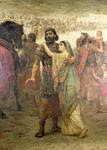'Not about conflict and resolution'
 I'm listening to a new CD recommended by Gramophone magazine, Not no faceless Angel, by Gabriel Jackson - (angels keep cropping up! see previous post). It is as the review says, 'of special beauty and appeal'. But I'm provoked by the composer's explanation of his music, 'I try to write music that is clean and clear in line, texture and structure; my pieces are made of simple melodies, chords, drones and ostinatos. They are not about conflict and resolution; even when animated, they are essentially contemplative.'
I'm listening to a new CD recommended by Gramophone magazine, Not no faceless Angel, by Gabriel Jackson - (angels keep cropping up! see previous post). It is as the review says, 'of special beauty and appeal'. But I'm provoked by the composer's explanation of his music, 'I try to write music that is clean and clear in line, texture and structure; my pieces are made of simple melodies, chords, drones and ostinatos. They are not about conflict and resolution; even when animated, they are essentially contemplative.'It was the bit, 'not about conflict and resolution'. This would be a similar philosophy to some of the holy minimalists, such as John Taverner. What provokes me is that while I greatly appreciate the experience of 'the sonic cathedral' from time to time, I find it limiting. The essence of music is the way in which a composer sets up conflict, or tension, and then resolves it. This is what makes music so alluring.
Stephen Hough, in his blog, asks the question, 'Can atonal music move you?' And he makes this incisive observation, 'Pure atonality's problem is its lack of reference points. If you take away the compass of tonality you take away tension - the magnetic pull is annulled.' A different issue, but again, the need for tension.
In relation to our world, while conflict, or tension, can be destructive, actually it is an integral part of what it means to be human. Life would be unimaginable without tension? The issue is not to remove it, but to live with it creatively. And when it comes to conflict or tension with others, the question with which we grapple is 'how do we manage our differences'? We need the difference and can't do without it, but it creates tension, or conflict, and that needs to be negotiated.
I find myself pondering what part tension, or even conflict in its creative sense, will play in God's future, new creation. I don't believe that the music of John Taverner, or Gabriel Jackson, however lovely it might be, is an accurate foretaste of that life.
Sort of related is this provocative prayer by Martin Wroe, called Noise:
They say you're available
on certain conditions.
Quiet ones.
That if I can find an air of tranquility
it carries that still small voice.
But I don't do quiet,
stillness.
I am not tranquil except when I am asleep
and then I am not available
as far as I know.
So,
what's the chance of a still big voice
in the noise,
of hearing you in the roaring traffic,
the screaming meal-time,
the crowded train,
the supermarket queue,
the smoky, throbbing bar?
I know that time you weren't
in the fire,
the storm.
But everyone's different.
Maybe Elijah was better at quiet.
You're usually quiet.
I'm usually wired.
If I try for your silence,
perhaps you could try for my noise.
Your place or mine?
I know they say you're in
the country,
but maybe we could meet in town.


Comments
The poem by Wroe is exegetically brilliant - if exegesis is the bringing of sacred story and our story together, in honest recognition. Where's it from Geoff?
This was his comment on views of Christian perfection as a state, rather than as a dynamic movement towards Christlikeness that can never be complete because it is ethical and ever transformative. Go treat yourself Geoff and read one of Forsyth's volumes - God the Holy Father is a good place to start. His is the voice of a passionate and eloquently blunt Scot, for whom the cross of Christ and the Christ of the cross is God's hapax legomena!